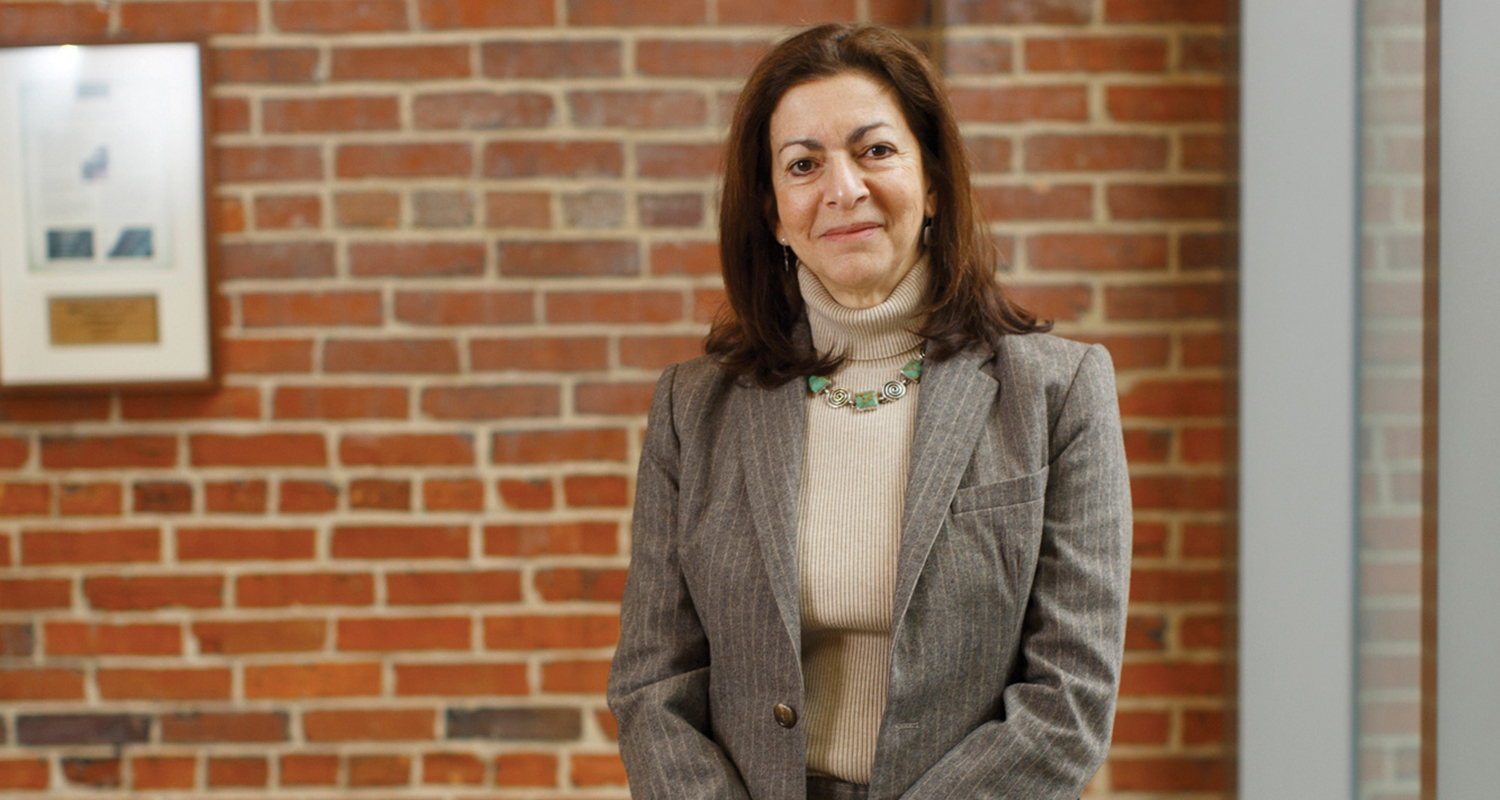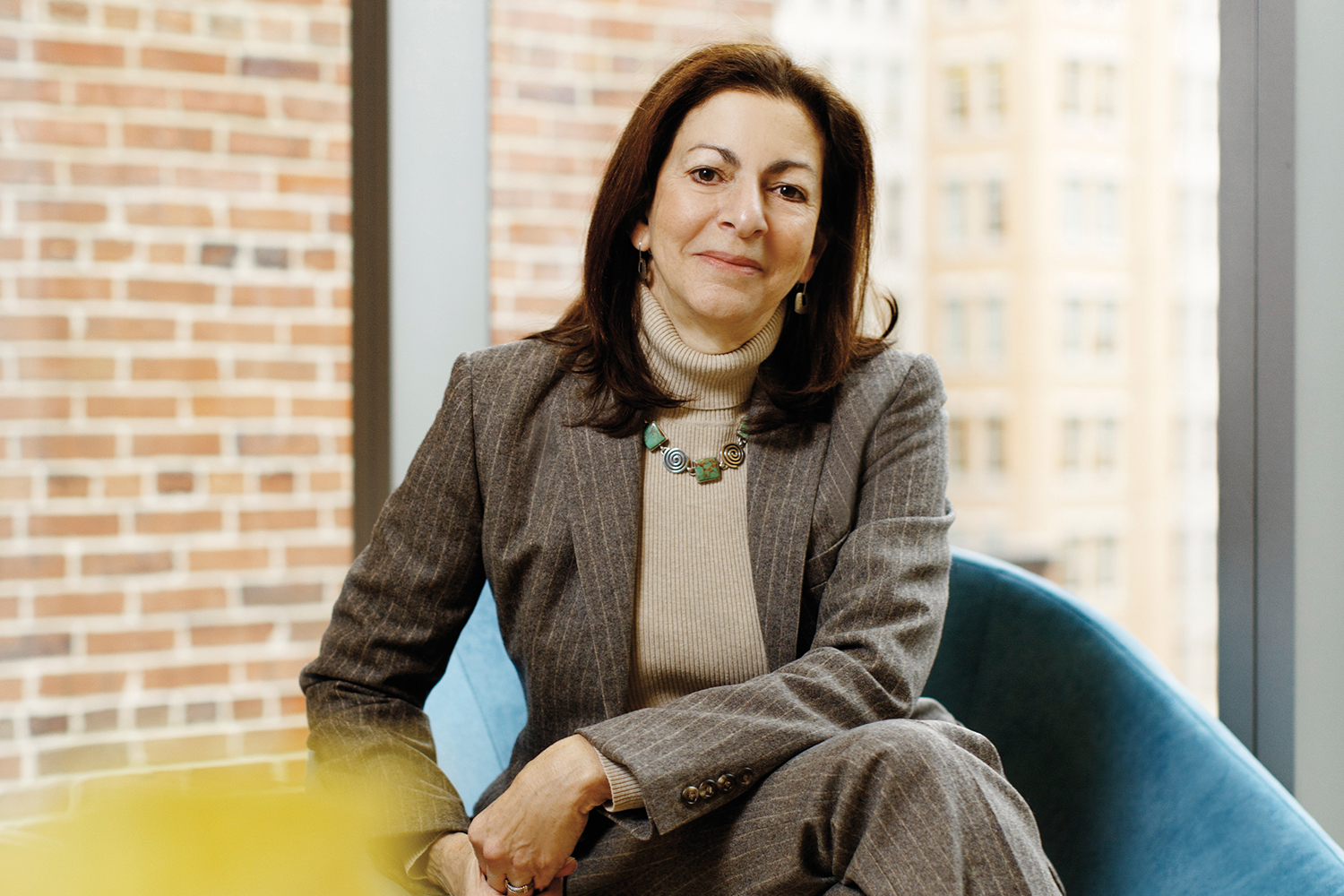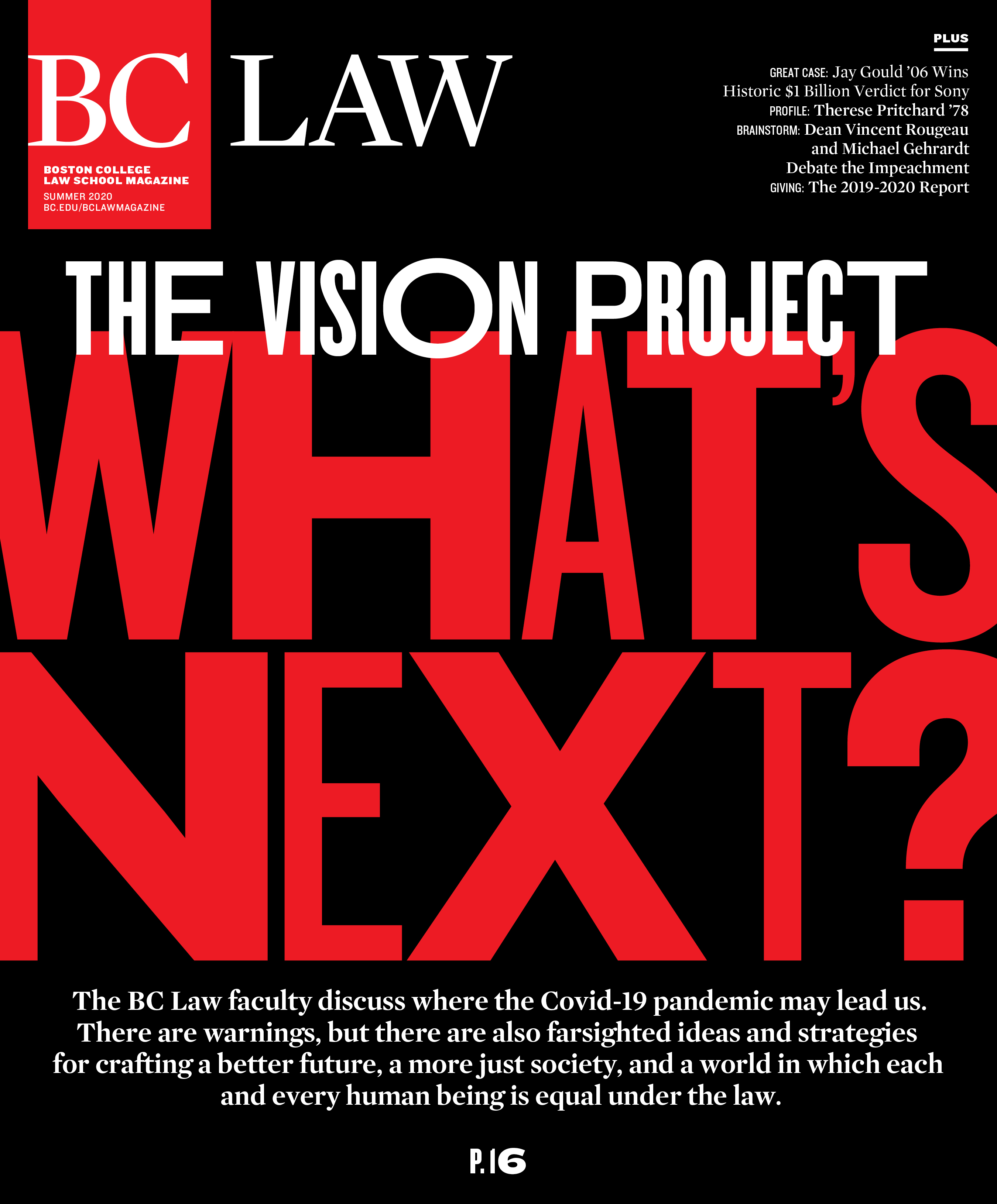When the Washington, DC, law firm Bryan Cave merged with the London firm Berwin Leighton Paisner in April 2018, it was big news. And no wonder.
The new firm, Bryan Cave Leighton Paisner, had combined revenues of $900 million, employed 1,400 lawyers, and operated thirty-two offices across eleven countries throughout the US, Europe, the Middle East, and Asia. It boasted the world’s fourth largest real estate practice, and one of the world’s most active global merger and acquisition practices. It represented nearly 200 Fortune 500 companies and thirty of the world’s top fifty banks.
It was also the first global law firm ever to be led by two women.
One was Therese Pritchard ’78.
In her remarkable five-decade career, Pritchard prosecuted some of Wall Street’s most notorious criminals. She uncovered what’s considered the greatest pre-Enron corporate fraud scandal in history, and many of her cases had an enduring impact on corporate governance and finance. She’s skilled at delivering tough news to top people and persuading them to make serious course-corrections. She’s a high-powered attorney with a down-to-earth work ethic: “When Terry gets into something, you will frequently find her in her office with her high heels off, her glasses on, sitting cross-legged in her chair, either intently going over testimony or preparing for a deposition or reviewing documents,” says her colleague LaDawn Naegle, a managing partner in her firm. She’s intense, but there’s a genuineness to Pritchard, Naegle says, that makes people trust her.
Pritchard herself dismisses any notion that her career unfolded according to some grand design. “Mine is a one-foot-in-front-of-the-other story,” she insists. “I think I am just one of those people who finds whatever is interesting about what is right in front of me.”
It’s a lesson she passes on to newly minted lawyers. “When I talk to first-year associates at their new associate training gathering,” she says, “I talk about taking the opportunity that lands in front of you. I think our younger generation likes to plan much more than my generation planned, or certainly, I planned. Some of my career was really about grasping what fell into my lap and running with it, and really getting great reward from that.”
As an assistant director of enforcement at the SEC, Pritchard investigated the 1980s insider trading and fraud scandals of Ivan Boesky, Michael Milken, and the investment bank Drexel Burnham Lambert. They and their multi-million dollar shenanigans made headlines, inspired entire books and films, and still resonate: In February of 2020, Michael Milken was pardoned by President Trump.
She chose law school as “kind of a default,” she says. “I couldn’t think of anything else that looked interesting. My father was a lawyer. He liked being a lawyer. It looked intellectually challenging and I wasn’t sure what else looked appealing.”
After graduating from BC Law, she worked as in-house counsel for the First National Bank of Boston, where she rotated through departments and discovered an interest in the federal regulatory system. When her husband Ivor, who has a PhD in philosophy, was offered a teaching position outside of Washington, DC, the couple moved and she landed a job in the enforcement division of the Securities and Exchange Commission. “Much of securities law is really a series of disclosure guidelines—what public companies disclose about their financial condition and their business focus, what insiders disclose to the other side of trades,” Pritchard says. “I found the issues around that to be interesting.”
As an assistant director of enforcement at the SEC, Pritchard investigated the 1980s insider trading and fraud scandals of Ivan Boesky, Michael Milken, and the investment bank Drexel Burnham Lambert. They and their multi-million dollar shenanigans made headlines, inspired entire books and films, and still resonate: In February of 2020, Michael Milken was pardoned by President Trump.
The cases changed the world of corporate finance. “I think it created a culture of compliance in the financial services industry that had not existed before. Before these cases, no significant financier had gotten into serious trouble with the government for violations of law since the Great Depression,” says John Sturc, who supervised Pritchard when he was associate director of the SEC’s Division of Enforcement. “After that, white collar enforcement came to be taken seriously both within the Justice Department generally and within the legal profession. It became a big part of law practice at major law firms which had not existed before.”
Sturc, who continued working with Pritchard after they both left the SEC for the DC law firm Gibson Dunne & Crutcher LLP, says, “Terry has an amazing nose for what is real and what is baloney. She has an ability, better than almost anybody I have ever met, to size up the credibility of both a person and of the evidence that they are purporting to give.

“She is the best negotiator I have ever met,” he continues. “Even though, in theory, I was the more senior partner and she was the more junior one, I had her do all the negotiations. She was much better than I was.”
More than once, Pritchard encountered thorny ethical issues. At the SEC, for example, she faced questions over the freezing of assets. Prosecutors will often use their power to freeze a defendant’s assets to ensure potential recovery. But, if a prosecutor goes overboard, a defendant won’t have the resources to mount an adequate defense. In a 2013 interview with the Securities and Exchange Commission Historical Society, Pritchard said, “I fell on the side of I don’t believe that people should be deprived of the ability to defend themselves.
“If you freeze somebody’s assets so there’s nothing left, they have no choice but to settle with you,” she continued. “I viewed that as not particularly appropriate behavior for an enforcement division.”
In the early 2000s, now at Bryan Cave, Pritchard found herself representing the Belgian speech-recognition technology business Lernout & Hauspie Speech Products. The company had “created bogus customers, booked circular transactions with shell companies, and recorded loans as sales from 1996 to 2000,” the Boston Business Journal reported at the time. The fraud involved hundreds of millions of dollars. It was probably the biggest corporate scandal ever, pre-Enron.
At the time, questions of corporate governance were less developed than they are today. When Pritchard discovered that the company’s management, who had hired her, wasn’t giving her proper information, she needed to step back and think about exactly who her client was—management? the board? the shareholders?—and what her obligations were.
Ultimately, she went to the board. “At the end of the day,” she explains, “the shareholders own the company and are entitled to know the truth about what is going on. The board represented the shareholders and therefore they needed to be the people seeing the evidence that I was seeing and making the decisions about what should be done.” Lernout & Hauspie soon went bankrupt. Its founders went to prison.
Not all corporations are wrongdoers, of course. They are companies that need legal guidance through tangles of laws and regulations, and this is what Pritchard provides. Naegle, Pritchard’s law firm partner, recalls a time when she witnessed Pritchard deliver detailed remedial advice to a company’s board of directors. “When the meeting was done,” Naegle says, “she left the room and I turned to the chairman of the board and said something along the lines of, ‘Do you have any questions or are we done here?’ He points to Terry in the outer office and says, ‘I know what I want to do. I want to bring your scary partner back because I want her to conduct all the training.’ Her level of seriousness and her ability to approach a very difficult, sensitive topic was what I think struck a chord for the board, and from then on, I referred to Terry as my scary friend who comes in to deliver difficult messages to officers and directors of public companies.”
“Terry has an amazing nose for what is real and what is baloney. She has an ability, better than almost anybody I have ever met, to size up the credibility of both a person and of the evidence that they are purporting to give. She is the best negotiator I have ever met.” —John Sturc, who supervised Pritchard at the SEC’s Division of Enforcement
Incidentally, Naegle and Pritchard were the only women at that board-of-directors meeting. According to the American Bar Association, in 1980, two years after Pritchard graduated from BC Law, around 8 percent of lawyers were women. Today, just 36 percent are women. Pritchard never let it ruffle her. Here’s what she told the SEC Historical Society about a training program she taught for the SEC’s new lawyers: “I would always stop and say, ‘Here’s a message for the women in the audience. There are men who are just not going to take you that seriously and who are going to think you don’t get what they are talking about. Go with it, because at the end of the day, it’s whether you win or lose that counts here.’ I used an example of a man who was saying something to me, and I said, ‘I don’t understand,’ and he said, ‘That’s because you don’t understand business.’ I said, ‘Okay, you might be right, please explain it to me,’ and he basically admitted to a violation of the securities law. So, my attitude was, that’s fine, if that’s the attitude they want to have, use it.”
Her husband Ivor says, “Early in her career, when she was at the Securities and Exchange Commission, and we had our first child, she ran into the policy that nobody could be less than full time and be a supervisor. She was, I believe, the first person there to make an arrangement for some time to work for less than full time after she came back from having her first child.” Ivor is a senior advisor to the US Department of Health and Human Services’ Office for Human Research Protections, which oversees regulations on human research subjects.
“One thing that really helped Terry a lot was not having her career or her family completely walled off from each other,” Ivor says. She’d talk about work at the family dinner table. If a work phone call came in on a weekend while she was busy in the garden, she could quickly switch gears, handle the matter, and then get back to gardening. And Ivor and their younger daughter played for the Bryan Cave softball team. “We would traipse down and play on the Mall with the people from the firm, and so there were times when there was family life and professional socializing going on at the same time,” he says.
In 2013, Bryan Cave needed to hire a new chair, and Pritchard threw her hat in the ring. The search committee polled the partners, asking them what they wanted in a leader. Among the answers: Someone who can assess the firm’s place in the market and can figure out where to position the firm in the short and long term.
According to Naegle, Pritchard’s assessment was that Bryan Cave needed to scale up and get out of the middle, where there was a lot of competition for the same work. In 2014, Pritchard, who at that point had been with Bryan Cave for about a decade and a half, became the first woman chair in the firm’s 140-year history.
Pritchard then led Bryan Cave through a visioning exercise. “Some of the things that came out of that were a desire to grow through a strategic combination”—that is, a merger—“and a desire to have a deeper global presence,” Pritchard says. Her research revealed that Berwin Leighton Paisner in London had been in negotiations with a US law firm, but the talks had fallen through. “I did a bit of research and saw a lot of practice and cultural synergies,” Pritchard says. “Our financial performance was somewhat similar as well. I reached out to Lisa [Mayhew, Berwin Leighton Paisner’s chair] on a bit of a false pretense. I was going to be visiting London, and suggested, since there were so few women running big firms, that it would be nice to meet her over breakfast while I was there. I told her over breakfast what I had seen and why I thought a combination might be worth exploring. A few weeks later, she called and asked for a second meeting. And the rest is history.”
The merger enabled the combined firms to grow and deepen their expertise in real estate, financial services, food and agriculture, corporations, and litigation, and to expand their global presence. “We are positioning ourselves to be able to handle everything because that is what the market demands,” Pritchard told the online publication Lawdragon in 2019.
Pritchard stepped down from the co-chair position in January 2020, when she was not eligible to run for another term. She resumed her practice in securities and financial institutions enforcement and litigation at the firm. Months later, Pritchard found herself counseling her clients during the devastating Covid-19 pandemic.
“The ultimate goal of any good lawyer in a big law firm is to be a trusted advisor to their client, and they need to find a way to continue to be that in this new environment,” Pritchard says. It’s a perfect summary of the basics of being a successful lawyer—in these times and all times.



